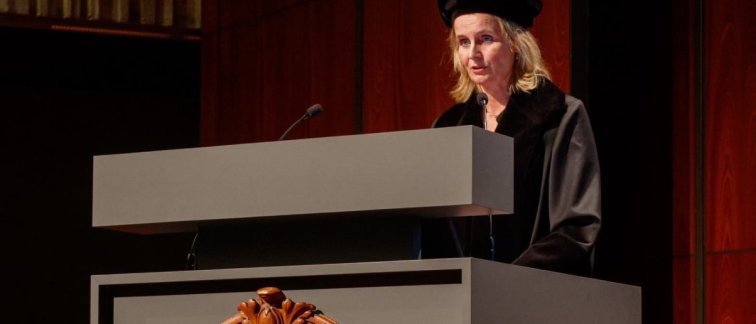On April 1 2022, the Executive Board of the Vrije Universiteit decided to appoint Dr. Conny van der Laken as Professor of Rheumatology, in particular the imaging of diseases of the musculoskeletal system. Prof. Van der Laken's chair is embedded in the Department of Rheumatology and Clinical Immunology, Division 1 of Amsterdam UMC and at the Amsterdam institute of Infection and Immunity (AII).
On November 25 2022, Prof. Van der Laken delivered her inaugural speech. Her research focuses on improving diagnosis and treatment of chronic rheumatic autoimmune diseases, in which the patient's immune system becomes active against the body's own tissue, by using imaging techniques. "Within my research patients are my driving force. To give you an example we go back a few years ago, a man about 70 years old appeared at my consultation. He had numerous complaints that greatly hampered him in daily life. Extensive analysis elsewhere of general symptoms of illness, weight loss and joint pain had yielded nothing. I decided to do a PET scan that revealed multiple inflammations in his joints, which could indicate rheumatoid arthritis or joint rheumatism. He received treatment for this and his symptoms completely disappeared!" Prof. Van der Laken says.
Another patient, an enthusiastic high school teacher, also made a deep impression on Prof. Van der Laken. Several very painful attachments of tendons at her joints, called enthesitis, prevented her from doing her job properly. Prof. Van der Laken: "It was with pain in her heart, therefore, that she decided to quit. Enthesitis is difficult to diagnose and difficult to treat. Her story prompted me to develop imaging technology for enthesitis".

Early detection and prevention
Prof. Van der Laken works closely with nuclear medicine physicians to visualize the immune system. For example, she develops marker substances that become visible in the patient's body with a PET scan. In her research group, both patient-specific and laboratory research takes place. By doing so, she aims to detect rheumatic diseases as early as possible. For rheumatoid arthritis, her research group already made progress in 2012: a PET scan with a marker substance can detect the disease over a year earlier than the rheumatologist can diagnose the disease with physical examination.
Tailored therapy
In addition to early detection, Prof. Van der Laken focuses on the right treatment for the right patient, also known as "personalized medicine". PhD students from Prof. Van der Laken's research group have shown that with a PET scan and an injection of specific PET markers in rheumatoid arthritis patients, it is possible to predict the effect of different rheumatoid drugs. This can already be done at an early stage of treatment.
Prof. Van der Laken also wants to use artificial intelligence, by training computers to read scans faster and more accurately. She explains: "By looking deeper with computers you can see more, so you have more image information to analyze. With this method we want to make the image information more adaptable for application in healthcare."
Education and collaboration
Prof. Van der Laken finds it important to properly convey her knowledge to students, and here too she makes use of digitization. She is proud of the MRI rheumatology e-learnings recently she recently developed for the Dutch Society of Rheumatology. Furthermore, Prof. Van der Laken likes to look beyond her own field by collaborating with researchers from other disciplines: "Zooming in gives detail and zooming out gives insight into the coherence of the environment. I see the same basis reflected in the scans of my research. I look forward to continuing to work with many other researchers on new developments and applications of imaging techniques in order to improve the treatment of patients with rheumatic diseases. Apart from inter-disciplinary collaboration I would also like to promote collaboration between fundamental and clinical researchers to boost translational research of rheumatic autoimmune diseases in two directions” Prof. Van der Laken says.
The Amsterdam institute for Infection and Immunity (AII) congratulates Conny van der Laken on her professorship and wishes her all the best in her bright future.
Discover more appointments within the Amsterdam institute for Infection and Immunity:
- Sander Tas has been appointed professor of rheumatology (October 2022)
- Dasja Pajkrt has been appointed member of the UvA Senate (October 2022)
- UvA Honorary doctorates for Ugur Sahin and Özlem Türeci (January 2022)

